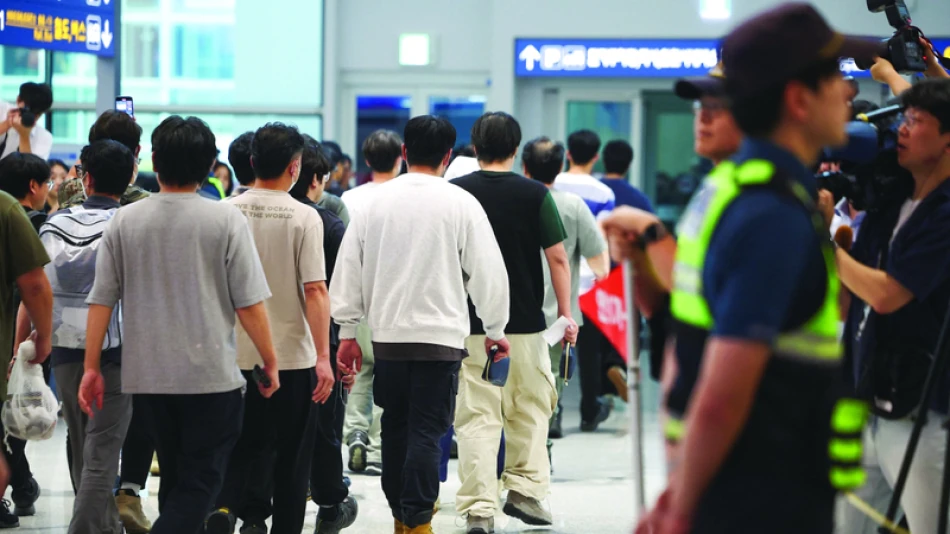
South Korean Workers Freed by US Return Home, Reunite with Families
Trump's Immigration Crackdown Hits Allied Investors as South Korean Workers Return Home
Over 300 South Korean workers have returned to Seoul after being detained in the largest single-site immigration raid since Donald Trump resumed his presidency, exposing deep tensions between America's immigration enforcement and its economic partnerships with key allies. The mass detention at a Hyundai-LG battery plant construction site in Georgia has sparked diplomatic concerns and raised questions about the future of foreign investment in U.S. manufacturing.
The Georgia Battery Plant Raid
U.S. immigration authorities detained 475 workers last week at a battery manufacturing facility under construction in Georgia, part of a joint venture between South Korean giants Hyundai and LG. The majority of those detained were South Korean nationals who arrived back at Incheon International Airport aboard a chartered Korean Air Boeing 747-8I flight from Atlanta.
According to immigration experts, most of the detained South Korean workers likely held visas that did not authorize construction work, creating a legal gray area that has become a flashpoint in U.S.-South Korea relations.
Scale of Trump's Immigration Operations
This raid represents the largest single-location immigration operation since Trump launched his renewed crackdown on undocumented workers following his return to office in January. The operation's scale and target—workers building infrastructure for a strategic industry—signals an aggressive approach that appears to make few distinctions between traditional undocumented migration and complex visa compliance issues involving allied nations.
Diplomatic Fallout and Economic Implications
South Korean President Lee Jae-myung described the factory raid as "puzzling," warning it could severely impact future investments. The diplomatic tension was visible at Incheon Airport, where protesters displayed banners mocking Trump and questioning U.S. treatment of its allies, with one sign reading: "You asked us to invest, then arrested us! Is this how you treat an ally?"
South Korea, Asia's fourth-largest economy, has significantly expanded its U.S. manufacturing presence in response to American calls for domestic production and increased investment. Companies like Hyundai, Samsung, and LG have committed billions to U.S. facilities, particularly in the electric vehicle and battery sectors that are central to America's clean energy transition.
Investment at Risk
Lee indicated that Seoul is negotiating with Washington to "ensure that visa issuance for investment-related purposes proceeds normally." This diplomatic language masks deeper concerns about whether South Korean companies can rely on consistent visa policies for their specialized workers and technicians.
Broader Context of Allied Relations
The incident highlights a fundamental tension in Trump's second-term agenda: aggressive immigration enforcement versus maintaining strong economic partnerships with allies. Unlike previous immigration raids targeting traditional industries like agriculture or hospitality, this operation struck at the heart of strategic manufacturing partnerships that both nations have promoted.
South Korea's substantial U.S. investments include major facilities across multiple states, often in politically significant regions. Hyundai's Georgia plant alone represents a multi-billion dollar commitment, while other Korean firms have established operations in states like Texas, Alabama, and Ohio.
Market and Policy Implications
For investors and multinational corporations, the Georgia raid signals potential complications in cross-border workforce management. Companies may need to reassess their visa strategies and worker deployment models when operating in the United States, particularly for specialized construction and technical roles.
The incident also raises questions about the intersection of immigration policy with industrial policy goals. The Biden administration had actively courted foreign investment in strategic sectors like battery manufacturing and semiconductors. Trump's approach suggests immigration enforcement may take precedence over these economic considerations, potentially affecting future foreign direct investment decisions.
As both governments work to resolve the immediate diplomatic tensions, the longer-term impact on South Korean investment confidence and U.S.-allied economic partnerships remains a critical question for the global manufacturing landscape.
Most Viewed News

 Sara Khaled
Sara Khaled






